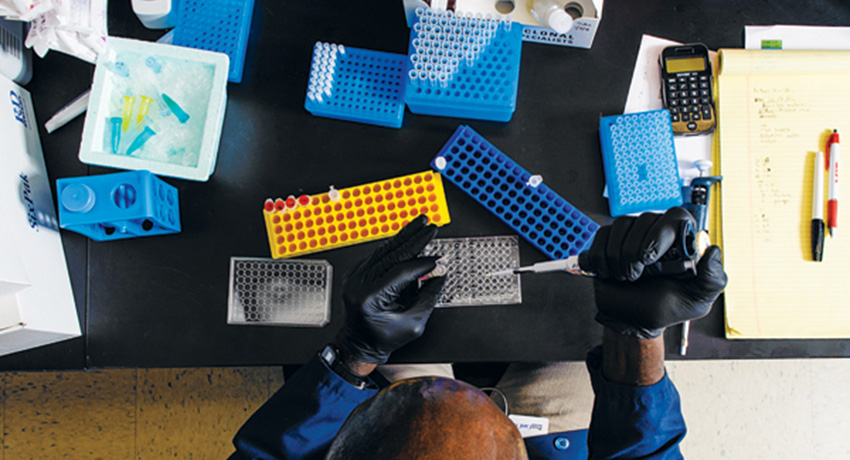Moderna Therapeutics Gets $240 Million Licensing Deal

Photo by Mark Fleming for “The NEXT Next Big Thing“
Moderna Therapeutics, a Cambridge-based biotech startup that Boston magazine profiled in the March 2013 issue, is disclosing Thursday that they will receive a $240 million upfront payment to license its protein-stimulating technology to drug giant AstraZeneca PLC. The Globe reports that AstraZeneca will use Moderna’s “messenger RNA” (mRNA—which is the targeted production of medicine inside the human body) technology to develop around 40 drugs over the next five years.
In our story, Catherine Elton explains what mRNA is:
Moderna claimed to have figured out a way of instructing specific cells to manufacture drugs on demand. The company said it had completed extensive preclinical trials, including a successful trial in nonhuman primates. Still to come was the final frontier: clinical trials in humans. If they proved successful, Moderna declared, it would be able to slash the rate of drug discovery from years to mere weeks, and treat dozens of diseases for which currently there were no drugs. The practice of medicine, and the pharmaceutical business, would be changed forever.
According to the Globe, Moderna will be eligible for another $180 million in payments if certain goals are met. Royalty payments could also be in the mix if and when drugs are approved in the U.S. and abroad. Clearly, AstraZeneca is putting its money behind what could be the next big thing in medicine.
Stephane Bancel, chief executive of Moderna tells the Globe:
“This is a historic deal,” said Stephane Bancel, chief executive of Moderna, who described it as the largest partnering agreement between a drug maker and a biotech that had not yet brought an experimental treatment to the clinical-trial stage of development. “This is a win-win. We are going to have so much money now that we can invest in hiring more people and developing more drugs.”
Bancel said Moderna will continue to pursue its own research into drugs for cancer and rare diseases and will double its space outside Kendall Square, where it now has 32 employees. He said the deal with AstraZeneca makes sense because “clinical trials in cardiology are very long and very expensive, and AstraZeneca is one of the best cardiology companies in the world.”
Treating cancers, genetic diseases, diabetes, and other conditions is the eventual goal for Moderna, and the new deal with AstraZeneca is the first step to making that happen. Moderna’s mRNA technology will be used to design therapeutics for the specific diseases mentioned above, and then it will be shipped to AstraZeneca, which will develop the drugs and then get the necessary approvals to put them on the market.
This is exciting news, but it’s also interesting timing because AstraZeneca announced Thursday that it’s cutting one-tenth of its workforce by 2016.


